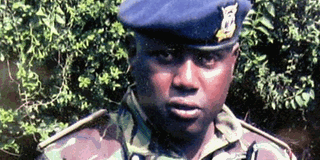Report blames poor planning for police massacre in Baragoi

File | NATION
Mr Joshua Waiganjo who posed as an assistant deputy Police Commissioner.
Poor planning and preparation led to the death of about fifty police officers and loss of over 50 firearms last year.
The botched Baragoi operation also raised questions on the alertness of officers assigned such duties, and the general police response in case of emergencies.
Though officer in charge of operations in Rift Valley Willy Lugusa and the police boss Samburu North, Mr Chrispinus Makhanu, opposed to the idea of conducting the ill-fated operation terming it risky.
However both former Provincial Police Officer John M’MBijiwe and the assistant deputy Police Commissioner impostor, Mr Joshua Waiganjo, ignored their objections and insisted that the operation had to go on as earlier planned.
In another attack in the Tana Delta in September last year, police officers were either hacked or hit with blunt objects but none of the officers fired even a single shot.
Investigations revealed that some officers were sent to such operations without being properly equipped, and even one of the deceased officers, Constable Peter Kimuyu, had been disarmed of his G3 rifle but continued being part of the group that was involved in the operation.
Security experts say that though the police force is ill-equipped with inadequate personnel, such deaths can be minimized if operations are well planned.
“Senior officers assigning their juniors duties should ensure that they are properly armed, depending on the area of work and the anticipated threat,” said George Musamali of the Executive Protection Services.
Mr Musamali added that proper battle preparation, including consideration for air support in case of serious attack was necessary, besides knowing the ground to watch, the possible direction of enemy approach, how to sound an alarm and to alert other colleagues.
“With adequate information on the weather, terrain and the enemy’s power, the number of casualties can be minimised,” he said.
Last week, about 500 officers protested and defied the orders from their seniors in Baragoi.
According to a signal BARA/OPS/OUT.VOL.II/1 seen by the Nation, most of the officers last week told off the deputy PPO Elias Oduor and refused to board the lorry that was to take them from their camp at Baragoi Girls Secondary to another camp, about 8kms away. The officers complained that they were not adequately armed and were not ready to sleep on bare ground.
However in some cases, the alertness of the officers on duty has also been questioned.
In the Garissa African Inland Church attack for example, the two officers on guard were shot at close range and their two firearms stolen.
The attackers drove into the church compound, alighted and started walking towards the two police officers, who were seated about 15 metres away. There were no struggles at all.
In other cases, officers have risked their lives by travelling alone while armed. Last Monday, an AP constable Joseph Mwato Mutua of Nakwamoru AP camp was robbed of his G3 rifle and two magazines both loaded with 40 rounds of ammunition. He was travelling in a lorry from Kainuk.
Deployment is also another contentious issue. Police are expected to deploy officers according to their skills. In Baragoi for example, the probe team recommended that a young and energetic police boss who has skills in field craft be posted to the area.
Other areas, though prone to banditry attacks, do not have senior officers. Most areas, including Baragoi have no intelligence officers and the CID bosses have no personnel, office spaces and vehicles.




